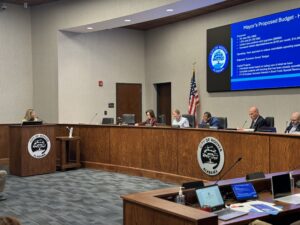Wes Allen: HB209 prevents absentee ballot harvesting and protects each individual’s right to cast their own ballot

Over the last decade, there have been multiple convictions for absentee ballot fraud across the state of Alabama. As a Probate Judge, a legislator, and now as Secretary of State, I am committed to eliminating election fraud in our state. HB209, sponsored by Rep. Jamie Kiel, makes incredible strides in protecting the rights of Alabama voters to cast their own votes without undue influence. Currently, it is legal for groups operating as non-profits to offer payments in exchange for absentee ballot applications to Alabama registered voters. HB209 would end that. Today, it is legal for out-of-state organizations to mail pre-filled absentee ballot applications to unsuspecting voters across the state, some of whom have moved or who have no intention of voting absentee. HB209 would prohibit this practice. HB209 would make it illegal to pay or to be paid by a third party to collect absentee ballot applications or absentee ballots from Alabama voters. Furthermore, it would eliminate the ability of organizations to sow the seeds of chaos and confusion by sending pre-filled absentee applications into our state. Our elections are the foundation of our constitutional republic, and nobody should be paid for their absentee application or their ballot. Ballot harvesting should not be a job description. Rep. Kiel shepherded HB209 through the Alabama House of Representatives and through the Senate committee. Senator Garlan Gudger will present HB209 for a vote to the entire State Senate and on to Governor Kay Ivey’s desk for her signature. I applaud these two legislators for their efforts to further secure Alabama’s elections and to help protect each individual Alabama voter’s right to cast their own ballot without interference. That is, after all, the foundation of this great nation. Wes Allen is Alabama’s 54th Secretary of State. Allen is a former Pike County judge and served one term in the Alabama House of Representatives representing Pike and Dale Counties.
Senate Committee advances gambling bill

On Wednesday, the Alabama Senate Tourism Committee voted to give a favorable report to a constitutional amendment allowing gambling establishments in Greene County to have historical horse racing gambling machines. Senate Bill 324 (SB324) is sponsored by State Senate Minority Leader Bobby Singleton (D-Greensboro). “This is a constitutional amendment,” Sing. “By rule 50, this has to be approved in both the Local Legislation Committee and the Tourism Committee. This has to do with “Racing and Parimutuel for Greene County.” “The Greene County Racing Commission asked me to carry this bill,” Singleton said. This will “add in historical horse racing at one or more tracks in the county.” Greenetrack in Greene County has been accused of illegally operating electronic gambling machines. The track unsuccessfully argued in court the machines were actually electronic charity bingo machines. “This bill has nothing to do with bingo in the county at all,” Singleton told the committee. A short public hearing was then held. Drusilla Jackson said, “I basically am in agreement with Senator Singleton with the bill, but the bill I came to ask you about is with the bill dealing with the midwives. This bill needs to be coming back to the floor. We are a rural county. We do not have a hospital that delivers babies in fifty miles.” Sen. Randy Price (R-Opelika) said, “That bill has been sent to Health as I understand it.” Attorney Eric Johnson said, “This bill is a very dangerous bill.” “It is a computer machine that will be doing some kind of historical racing,” Johnson said. “He does not have to pick a race. There is no skill involved in that.” “With this constitutional amendment, Greene County will have unlimited gambling on what they call parimutuel machines.” Stephanie Holden-Smith is the President of the Alabama Policy Institute. President Holden-Smith spoke against the bill, “It actually expands the definition of parimutuel betting.” Singleton said, “We have an attorney general’s opinion that goes back to Attorney General Pryor,” Sen. Greg Albritton (R-Atmore) said, “I am not going to fight or stand in the way, but I have got some statements to make when it gets to the floor.” The Tourism Committee voted to give the bill a favorable report in a 12 to 0 vote. Albritton added, “I would sure be nice if we could get that same vote on a much bigger type of gambling bill.” SB324 could be considered by the full Senate as early as Thursday. Thursday is legislative day 26 of the 2023 Alabama Regular Legislative Session. To connect with the author of this story or to comment, email brandonmreporter@gmail.com.
Alabama Senate Committee advances mandatory kindergarten bill

On Wednesday, the Alabama Senate Education Policy Committee advanced legislation requiring every Alabama six-year-old to either have completed kindergarten or pass a competency test to enter first grade. Children who fail the test will be forced to attend kindergarten rather than first grade with their peers. House Bill 43 (HB43) is sponsored by State Representative Pebblin Warren (D-Tuskegee), who has carried this legislation for the last few years. “This issue has become a really important issue in the State of Alabama,” Warren said. “It is a tragedy that we would let a child reach third grade without being able to read competently.” This is the fourth year that Warren carried similar legislation. It has not passed the Senate in the past. Governor Kay Ivey endorsed the bill in her State of the State speech. “A child can attend kindergarten or maybe in homeschooling, private schooling, or religious schooling,” Warren explained. “As long as they demonstrate competence, they can enter into first grade.” Sen. Rodger Smitherman (D-Birmingham) asked how much this would cost in the fiscal note. “$8.4 million,” Warren answered. “We are just preparing them to fail,” Smitherman said. “Requiring those little children to pass this without doing any of that is setting up these kids to fail. We know that the resources are not there .” Sen. Jay Hovey (R-Auburn) said, “I would prefer this as an opportunity to identify needs and opportunities to avoid problems later on. I would rather catch it now in kindergarten and first grade than third and fourth grade. Hovey said, “It is easier and less disruptive to fail them then than it would be in third, fourth, or fifth grade.” Smitherman said, “We haven’t provided nothing for them. You think it is alright to flunk them if they are six years old?” “I hope there is a way we can facilitate that tutoring,” Hovey said. “I hope that we can find a way to raise them up.” “How are they going to get where you want them to get without giving them any money or structure?” Smitherman said. “I am hurt that we are even considering this.” Warren said, “This is already being enacted by the state school board.” Sen. Donnie Chesteen (R-Dothan) said, “We have some questions that need to be answered. Rep. Warren.” Chesteen is the Chairman of the Senate Education Policy Committee. Sen. Kirk Hatcher (D-Montgomery) said, “My professional worth is as an educator. I am the Director of Montgomery Head Start. I would almost rather disagree with God than disagree with my mentor Senator Smitherman.” Hatcher said that if a child is six years old and doesn’t know their numbers, colors, or ABCs and can’t write their name, “they are woefully behind.” Hatcher said that if a child cannot read by the third grade, “They drop off rapidly. The numbers are startling.” “Money needs to be put in the kindergarten program,” Hatcher said, “We have got to do something.” Hatcher said that he favored funding an “at-risk program.” “I am on the side of mandating kindergarten,” Hatcher said. The Committee then entertained a motion to give HB43 a favorable report. Smitherman said, “No, with every fiber of our being.” The motion carried, and the Committee voted to advance the legislation to the full Senate. Warren said, “Thank you, and on behalf of the children of Alabama, I say thank you.” Chesteen said, “Rep. Warren, get with Sen. Smitherman before it gets to the floor (of the Senate).” The full Senate could consider HB43 as soon as Thursday. The House previously voted to pass HB43 in a vote of 87 to 12. Thursday will be day 26 of the 2023 Alabama Regular Legislative Session. The Alabama Constitution of 1901 limits the legislature to no more than 30 legislative days in the regular session. To connect with the author of this story or to comment, email brandonmreporter@gmail.com.
Legislature sends the Yellowhammer cookie legislation to Gov. Kay Ivey

On Wednesday, the Alabama Senate voted unanimously to make the Yellowhammer cookie the official cookie of the state of Alabama. The Yellowhammer cookie is the creation of Mary Claire Cook, a fourth-grade student at Trinity Presbyterian School in Montgomery, with some help from her grandmother. The students at Trinity were studying state symbols when they learned that Alabama did not have an official state-designated cookie, so they endeavored to create one. House Bill 421 (HB421) is sponsored by State Representative Reed Ingram (R-Montgomery). The legislation was carried in the Alabama Senate by State Senator Will Barfoot (R-Pike Road). “This week, you all have had the opportunity to see, and more importantly taste, the yellowhammer cookie,” Barfoot said, holding one up in the air for members to see. This was brought to me by some fourth graders at Trinity Presbyterian School.” “Twenty-four recipes were submitted,” Barfoot said. “That was narrowed down to five. Seniors from the government class at Trinity were brought in to judge the cookies, and the yellowhammer cookie was selected.” The cookies contain peanuts, pecans, and oats – all crops grown and well-adapted to Alabama. The pecan is already the official nut of Alabama, and the peanut is the official legume of the state of Alabama. “George Washington Carver’s work at Tuskegee Institute on peanuts is important to Alabama,” Barfoot said. Sen. Linda Coleman-Madison (D-Birmingham) said that the contest to select the state cookie should have been more “statewide.” “I think there should be some guidelines if we are going to do it,” Coleman-Madison said. “There are children who have food allergies to peanuts. I really wish we had some more participation.” “This is state law that we are passing,” Coleman-Madison continued. “When people come to the state of Alabama, this is the state cookie. We need to have some criteria. We need to have some more involvement.” Sen. David Sessions (R-Mobile) said, “It has peanuts and pecans. I raise both of them on my farm.” The legislation passed the Senate 35 to 0. Cook was viewing from the gallery with her teachers Katherine Bandy and Kylie Osborne. Lieutenant Governor Will Ainsworth recognized Cook for her work, and she was applauded by the members of the Senate. The legislation has already passed the House of Representatives. It now goes to the Governor for her consideration. Wednesday was day 25 of the 2023 Alabama Regular Legislative Session. To connect with the author of this story or to comment, email brandonmreporter@gmail.com.
Ron DeSantis announces 2024 White House bid in Twitter announcement plagued by glitches

Florida Gov. Ron DeSantis launched his 2024 presidential campaign on Wednesday with firm words but a disastrous Twitter announcement that did little to counter criticism that the 44-year-old Republican may not be ready to take on former President Donald Trump. While he tried to project confidence, DeSantis’ unusual decision to announce his campaign in an online conversation with Twitter CEO Elon Musk ultimately backfired. The audio stream crashed repeatedly, making it virtually impossible for most users to hear the new presidential candidate in real-time. “American decline is not inevitable, it is a choice. And we should choose a new direction — a path that will lead to American revitalization,” DeSantis said on the glitchy stream, racing through his conservative accomplishments. “I am running for president of the United States to lead our great American comeback.” While his critics in both parties delighted in the rocky start, DeSantis’ announcement marks a new chapter in his extraordinary rise from little-known congressman to two-term governor to a leading figure in the nation’s bitter fights over race, gender, abortion, and other divisive issues. DeSantis’ path to the Republican presidential nomination will not be an easy one. He enters the race looking up at Trump in early polls while facing serious questions about his far-right policies, his campaign-trail personality, and his lack of relationships across the Republican ecosystem. He has generated significant interest among GOP primary voters by casting himself as a younger and more electable version of the 76-year-old former president. He did not mention Trump even once in his discussion with Musk, which ultimately spanned more than an hour. But he said he was ready to fight. “Buckle up when I get in there because the status quo is not acceptable,” DeSantis said. The ultimate Republican nominee is expected to face Democratic President Joe Biden on the general election ballot in November 2024. DeSantis joins a field that also includes former U.N. Ambassador Nikki Haley, Sen. Tim Scott of South Carolina, former Arkansas Gov. Asa Hutchinson, and biotech entrepreneur Vivek Ramaswamy. Former Vice President Mike Pence is also considered a likely presidential candidate but has not yet announced a bid. The governor has been courting primary voters in key states for much of the year and using an allied super political action committee to build a large political organization that was essentially a campaign in waiting and claims at least $30 million in the bank. In choosing Twitter on Wednesday evening, DeSantis tried to take a page out of the playbook that helped turn businessman-TV celebrity Trump into a political star. It did not go as planned. The online event started off with technical glitches that Musk said were due to “straining” servers because so many people were trying to listen to the audio-only event. More than 20 minutes passed beyond the scheduled start time with users getting kicked off, hearing microphone feedback, hold music, and other technical problems. “You can tell by the mistakes that it’s real,” said Musk. DeSantis’ Republican opponents piled on. The lead strategist for Haley’s super PAC, Mark Harris, was merciless: “Failed soft launch? Check. Failed announcement? Double check. We look forward to Ron DeSantis’ failed campaign.” “This is a disaster. Not surprising,” tweeted senior Trump adviser Chris LaCivita. DeSantis, who likely would not have become the Florida governor without Trump’s endorsement, has adopted the former president’s fiery personality, his populist policies, and even some of his rhetoric and mannerisms. Yet DeSantis has one thing his rival does not: a credible claim that he may be more electable than Trump, who faces multiple legal threats, including criminal charges in New York, and who presided over Republican losses in three consecutive national elections. DeSantis, just six months ago, won his reelection in Florida by a stunning 19 percentage points — even as Republicans in many other states struggled. He also scored several major policy victories during the Republican-controlled Legislature’s spring session. Aware of DeSantis’ draw, Trump has been almost singularly focused on undermining his political appeal for months. Trump and his team believe that DeSantis may be Trump’s only legitimate threat for the nomination. Hours before the announcement, Trump argued in a social media post that “Ron DeSanctus” cannot win the general election or the GOP primary because of his previous votes in Congress on Social Security and Medicare. “He desperately needs a personality transplant and, to the best of my knowledge, they are not medically available yet,” Trump added. “A disloyal person!” The kitchen-sink attacks and nicknames won’t be DeSantis’ only hurdle. He is a political heavyweight in Florida and a regular on Fox News, but allies acknowledge that most primary voters in other states don’t know him well. Despite his lengthy resume, friends and foes alike note that DeSantis struggles to display the campaign-trail charisma and quick-on-your-feet thinking that often defines successful candidates at the national level. He has gone to great lengths to avoid unscripted public appearances and media scrutiny while governor, which is difficult, if not impossible, as a presidential contender. The Florida governor spent most of Wednesday behind closed doors. In an example of his level of media avoidance, his official Twitter account for governor posted a photo shortly after the FEC filing — a bill signing surrounded by dozens of bikers for legislation to help reduce motorcycle accidents in Florida. The media was not notified of the event ahead of time. Late Wednesday, DeSantis’ office announced that he signed a broad election law bill that contains a provision allowing him to run for president without resigning his post as governor, exempting himself from a state rule known as “resign to run.” Would-be supporters also worry that DeSantis has refused to invest in relationships with party leaders or fellow elected officials, raising questions about his ability to build the coalition he would ultimately need to beat Trump. By contrast, Trump has scooped up an army of endorsements in key states, including Florida. Beyond the primary, DeSantis’ greatest longer-term challenge may rest with the far-right policies he enacted as governor as an unapologetic leader in what he calls his “war on woke.” “We will never surrender
2 former Alabama governors from opposite sides of the political aisle express doubts over executions

Two former Alabama governors, from opposite sides of the political aisle, wrote in an opinion piece that they are now troubled by the state’s death penalty system and would commute the sentences of inmates sentenced by judicial override or divided juries. Former Gov. Don Siegelman, a Democrat, and former Gov. Robert Bentley, a Republican, who both oversaw executions while in office, penned the Tuesday opinion piece for The Washington Post. The governors said that have both come “to see the flaws in our nation’s justice system and to view the state’s death penalty laws in particular as legally and morally troubling.” “We missed our chance to confront the death penalty and have lived to regret it, but it is not too late for today’s elected officials to do the morally right thing,” the governors wrote. Bentley and Siegelman each let eight executions go forward while they were in office, according to a list maintained by the Alabama Department of Corrections. The governors said they are particularly concerned that a large number of the state’s death row population was sentenced to death by either divided juries or over a jury’s recommendation. Alabama, in 2017, became the last state to end the practice of allowing judges to override a jury’s sentence in a capital case and send a person to death row when a jury recommended life imprisonment — a practice that critics argued interjected election-year pressure into sentencing decisions. But the change was not retroactive and did not impact inmates already sentenced to death by judicial override. “As governors, we had the power to commute the sentences of all those on Alabama’s death row to life in prison. We no longer have that constitutional power, but we feel that careful consideration calls for commuting the sentences of the 146 prisoners who were sentenced by non-unanimous juries or judicial override, and that an independent review unit should be established to examine all capital murder convictions,” the two governors wrote. Only four states out of the 27 that allow the death penalty do not require a unanimous jury to sentence an inmate to death. Alabama allows a death sentence with 10-2 decision in favor of execution. Florida Gov. Ron DeSantis last month signed legislation ending that state’s unanimous jury requirement and allowing death sentences when at least eight jurors are in favor. Missouri and Indiana let a judge decide when there is a divided jury. The governors cited statistics from the Death Penalty Information Center that one person on death row has been exonerated for every 8.3 executions. Applying that exoneration rate to the 167 people on Alabama’s death row, Siegelman said would suggest as many as 20 inmates could have been wrongfully convicted. “We all should agree that if the state is going to be in the business of killing people, that we should make sure that we have the right person,” Siegelman told The Associated Press in a telephone interview Tuesday night. Siegelman said after reviewing cases that he is now personally haunted by one of the eight executions that happened during his time as governor. Freddie Wright was put to death in Alabama’s electric chair in 2000 after being convicted of killing a couple during a robbery. Siegelman declined to stop the execution, saying at the time that the “death penalty is appropriate in this case.” Twenty-three years later, Siegelman said that he now believes Wright “was wrongfully charged, prosecuted and convicted for a murder he most likely did not commit.” Siegelman said that he “never felt comfortable with the death penalty” but that his views have evolved over the years, at least partly sparked by his own criminal conviction. The last Democratic governor in a state now dominated by Republicans, Siegelman was convicted of federal bribery and obstruction of justice charges largely related to his appointment of a campaign donor to a state board. Siegelman, who has maintained his innocence, said he came to see the system as flawed. Republished with the permission of The Associated Press.
Judge denies bond for ex-Alabama basketball player Darius Miles on capital murder charge

A judge denied bond Wednesday for former Alabama basketball player Darius Miles, who is facing a capital murder charge related to a fatal shooting near campus. Tuscaloosa County Circuit Judge Daniel Pruet said at a hearing Wednesday that the bond issue could be revisited later. Miles has pleaded not guilty in the January shooting death of 23-year-old Jamea Harris. The former reserve forward and Michael Lynn Davis, both 21 at the time, are charged with capital murder. Former Alabama teammates including Jahvon Quinerly, Jaden Quinerly, and Noah Gurley attended the hearing, according to al.com. The shooting occurred on the Strip, a student-oriented business district of bars and restaurants near the Tuscaloosa campus. Investigators said Harris was sitting in the passenger seat of a car when she was struck by a bullet, which brings a capital murder charge in Alabama. Davis is accused of firing the gun that killed the young woman, according to court documents filed in Tuscaloosa. Investigators wrote in a court document that Miles admitted to providing the handgun immediately before the shooting. Defense lawyers suggested in an earlier court hearing that the two were reacting defensively following an altercation with a young man in Harris’ group. Miles was dismissed from the Alabama team after his arrest. Republished with the permission of The Associated Press.
Alabama House committee advances bill to cut half of state’s 4% sales tax on groceries

Alabama lawmakers on Wednesday advanced legislation to remove half of the state’s 4% sale tax on food, a proposal that has garnered wide bipartisan support among lawmakers this year. The House Ways and Means Education Committee approved the tax cut as part of an appropriations package that also included a nearly $9 billion education trust fund budget, the creation of a new state savings account, and a one-time tax rebate of $210 per tax person. The bills now move to the full House of Representatives. Alabama is one of only three states that tax groceries at the same rate as other purchases. Removing the tax has been unsuccessfully proposed for decades in Montgomery, but has finally gained traction this year in the face of the budget surplus and soaring food prices. The proposed legislation would gradually remove the tax, provided there is enough growth in tax collections to offset the revenue loss, until the tax drops to 2%. Proponents said reducing the tax would help Alabamians every time they walk in the grocery store. “Untaxing groceries has long been at the top of the list to help regular, everyday working-class folks who spend a disproportionate amount of our income on sales taxes like groceries,” Robyn Hyden of Alabama Arise, an organization that lobbies for policies benefiting low-income families, told the committee. Almost every member of the Alabama Legislature is in support of the proposal. All 35 state senators and 100 of the 105 representatives have signed on as sponsors of the initial legislation. But some groups, including the organization that lobbies for teachers and public school employees, expressed concern about a loss of revenue for the state education budget. The 4% tax provides $608 million annually to the state, according to estimates from the Legislative Services Agency. Allison King of the Alabama Education Association told the committee the state’s budget surplus is temporary. “AEA is not against cutting grocery taxes, but we are against cutting grocery taxes without an equally reliable funding source to replenish the lost revenue,” King said. King said while Alabama is one of the few states to fully tax groceries, most other states have higher property taxes or other revenue sources to fund education. In the wake of a record education budget surplus, legislative leaders said, they are trying to strike a balance between spending, tax breaks and and saving. The committee also approved an $8.8 billion education trust fund budget that includes a 2% pay raises for public K-12 education employees. The House committee on Wednesday also increased the amount of proposed one-time tax rebates. The committee approved rebates of $210 per taxpayer and $420 for married couples. That is double the size of the rebates approved by the Senate. Lawmakers are also proposing to steer nearly $300 million to a new savings account called the Educational Opportunities Reserve Fund, which could be tapped during a revenue shortfall or to address education needs as they arise. “All of this extraordinary revenue is going to run out eventually … so having a little reserve, and extra places where we have put money away that we could slide into those low points, is very, very wise,” said Rep. Terri Collins, R-Decatur. Republished with the permission of The Associated Press.


